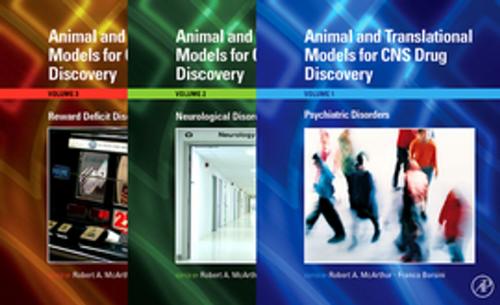Animal and Translational Models for CNS Drug Discovery
Nonfiction, Health & Well Being, Medical, Medical Science, Pharmacology, Science & Nature, Science, Biological Sciences, Zoology| Author: | ISBN: | 9780080920412 | |
| Publisher: | Elsevier Science | Publication: | November 27, 2008 |
| Imprint: | Academic Press | Language: | English |
| Author: | |
| ISBN: | 9780080920412 |
| Publisher: | Elsevier Science |
| Publication: | November 27, 2008 |
| Imprint: | Academic Press |
| Language: | English |
Animal and Translational Models for CNS Drug Discovery combines the experience of academic, clinical and pharmaceutical neuroscientists in a unique collaborative approach to provide a greater understanding of the relevance of animal models of neuropsychiatric disorders and their role as translational tools for the discovery of CNS drugs being developed for the treatment of these disorders. The focus of this three-volume series of essays is to present a consensual picture of the translational value of animal models from leading experts actively involved in the use of animal models for understanding fundamental neurobiology of CNS disorders and the application of this knowledge to CNS drug discovery, and clinical investigators involved in clinical trials, drug development and eventual registration of novel pharmaceuticals.
Each volume of the Animal and Translational Models for CNS Drug Discovery series is dedicated to the development and use of animal models in key therapeutic areas in psychiatric, neurologic and reward deficit disorders. Each volume has introductory chapters expressing the view of the role and relevance of animal models for CNS drug discovery and development from the perspective of (a) academic basic neuroscientific research, (b) applied pharmaceutical drug discovery and development, and (c) issues of clinical trial design and regulatory agencies limitations. Each volume examines the rationale, use, robustness and limitations of animal models in relevant therapeutic areas and discusses the use of animal models for target identification and validation. The clinical relevance of animal models is discussed in terms of major limitations in cross-species comparisons, clinical trial design of drug candidates, and how clinical trial endpoints could be improved. The aim of this series of volumes on Animal and Translational Models for CNS Drug Discovery is to identify and provide common endpoints between species that can serve to inform both the clinic and the bench with the information needed to accelerate clinically-effective CNS drug discovery.
- Provides clinical, academic, government and industry perspectives fostering integrated communication between principle participants at all stages of the drug discovery process
- Critical evaluation of animal and translational models improving transition from drug discovery and clinical development
- Emphasizes what results mean to the overall drug discovery process
- Explores issues in clinical trial design and conductance in each therapeutic area
- Each volume is available for purchase individually.
Animal and Translational Models for CNS Drug Discovery combines the experience of academic, clinical and pharmaceutical neuroscientists in a unique collaborative approach to provide a greater understanding of the relevance of animal models of neuropsychiatric disorders and their role as translational tools for the discovery of CNS drugs being developed for the treatment of these disorders. The focus of this three-volume series of essays is to present a consensual picture of the translational value of animal models from leading experts actively involved in the use of animal models for understanding fundamental neurobiology of CNS disorders and the application of this knowledge to CNS drug discovery, and clinical investigators involved in clinical trials, drug development and eventual registration of novel pharmaceuticals.
Each volume of the Animal and Translational Models for CNS Drug Discovery series is dedicated to the development and use of animal models in key therapeutic areas in psychiatric, neurologic and reward deficit disorders. Each volume has introductory chapters expressing the view of the role and relevance of animal models for CNS drug discovery and development from the perspective of (a) academic basic neuroscientific research, (b) applied pharmaceutical drug discovery and development, and (c) issues of clinical trial design and regulatory agencies limitations. Each volume examines the rationale, use, robustness and limitations of animal models in relevant therapeutic areas and discusses the use of animal models for target identification and validation. The clinical relevance of animal models is discussed in terms of major limitations in cross-species comparisons, clinical trial design of drug candidates, and how clinical trial endpoints could be improved. The aim of this series of volumes on Animal and Translational Models for CNS Drug Discovery is to identify and provide common endpoints between species that can serve to inform both the clinic and the bench with the information needed to accelerate clinically-effective CNS drug discovery.
- Provides clinical, academic, government and industry perspectives fostering integrated communication between principle participants at all stages of the drug discovery process
- Critical evaluation of animal and translational models improving transition from drug discovery and clinical development
- Emphasizes what results mean to the overall drug discovery process
- Explores issues in clinical trial design and conductance in each therapeutic area
- Each volume is available for purchase individually.















